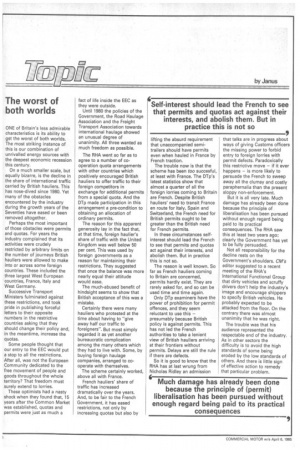The worst of both worlds
Page 32

If you've noticed an error in this article please click here to report it so we can fix it.
ONE of Britain's less admirable characteristics is its ability to get the worst of both worlds. The most striking instance of this is our combination of unrivalled energy sources with the deepest economic recession this century.
On a much smaller scale, but equally bizarre, is the decline in the share of international traffic carried by British hauliers. This has nose-dived since 1980. Yet many of the obstacles encountered by the industry during the growth years of the Seventies have eased or been removed altogether.
Perhaps the most important of those obstacles were permits and quotas. For years the industry complained that its activities were crudely restricted by arbitrary limits on the number of journeys British hauliers were allowed to make into or across some foreign countries. These included the three largest West European countries, France, Italy and West Germany.
Successive Transport Ministers fulminated against these restrictions, and took pride in publishing forceful letters to their opposite numbers in the restrictive countries asking that they should change their policy and, in the meantime, increase the quotas.
Some people thought that our entry to the EEC would put a stop to all the restrictions. After all, was not the European Community dedicated to the free movement of people and goods throughout the whole territory? That freedom must surely extend to lorries.
These optimists had a nasty shock when they found that, 15 years after the Common Market was established, quotas and permits were just as much a fact of life inside the EEC as they were outside.
Until 1980 the policies of the Government, the Road Haulage Association and the Freight Transport Association towards international haulage showed an unusual degree of unanimity. All three wanted as much freedom as possible.
The RHA went so far as to agree to a number of cooperation quota arrangements with other countries which positively encouraged British hauliers to offer traffic to their foreign competitors in exchange for additional permits from a special quota. And the DTp made participation in this arrangement a pre-condition to obtaining an allocation of ordinary permits.
The reason for this apparent generosity lay in the fact that, at that time, foreign haulier's share of traffic with the United Kingdom was well below 50 per cent. This was used by foreign governments as a reason for maintaining their restrictions. They suggested that once the balance was more nearly equal their attitude would ease.
The much-abused benefit of hindsight seems to show that British acceptance of this was a mistake, Certainly there were many hauliers who protested at the time about having to "give away half our traffic to foreigners". But most simply regarded it as yet another bureaucratic complication among the many others which they had to live with. Some, by buying foreign haulage companies, arranged to cooperate with themselves.
The scheme certainly worked, above all with France.
French hauliers' share of traffic has increased dramatically over the years. And, to be fair to the French Government, it has eased restrictions, not only by increasing quotas but also by lifting the absurd requirement that unaccompanied semitrailers should have permits even when hauled in France by French traction.
The trouble now is that the scheme has been too succesful, at least with France. The DTp's latest statistics show that almost a quarter of all the foreign lorries coming to Britain are French. Despite British hauliers' need to transit France en route for Italy, Spain and Switzerland, the French need for British permits ought to be greater than the British need for French permits.
In these circumstances selfinterest should lead the French to see that permits and quotas act against their interests, and abolish them. But in practice this is not so.
The reason is well known. So far as French hauliers coming to Britain are concerned, permits hardly exist. They are rarely asked for, and so can be used time and time again.
Only DTp examiners have the power of prohibition for permit offences, and they seem reluctant to use this — presumably because British policy is against permits. This has not led the French authorities to take a lenient view of British hauliers arriving at their frontiers without permits. Delays are still the rule if there are defects.
So it is good to know that the RHA has at last wrung from Nicholas Ridley an admission that talks are in progress about ways of giving Customs officers the missing power to forbid entry to foreign lorries with permit defects. Paradoxically this restrictive move — if it ever happens — is more likely to persuade the French to sweep away all the clumsy and costly paraphernalia than the present sloppy non-enforcement.
But it is all very late. Much damage has already been done because the principle of liberalisation has been pursued without enough regard being paid to its practical consequences. The RHA saw this at least two years ago; clearly the Government has yet to be fully persuaded.
Not all responsibility for the decline rests on the Government's shoulders. CM'S editor suggested to a recent meeting of the RHA's International Functional Group that dirty vehicles and scruffy drivers don't help the industry's image and encourage shippers to specify British vehicles. He probably expected to be attacked from the floor. On the contrary there was almost unanimity that he was right.
The trouble was that his audience represented the respectable end of the industry. As in other sectors the difficulty is to avoid the high standards of some being eroded by the low standards of others. And there is little sign of effective action to remedy that particular problem.




























































































